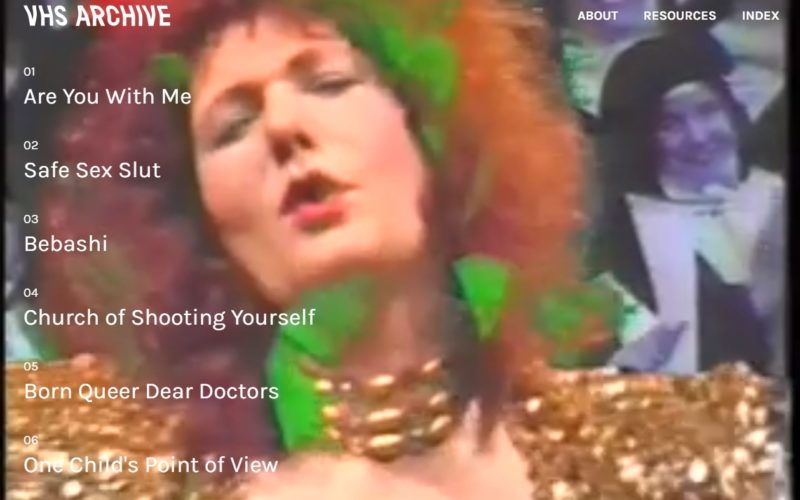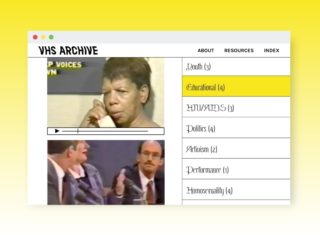This post is part of an ongoing series of writing about the VHS Archives working group; this group is supported by the Seminar on Public Engagement and Collaborative Research.
Alexandra Juhasz
The VHS Archives Working Group worked. Sponsored by the Center for the Humanities* at the CUNY GC, and engaging in 2017-2018 over seven meetings and one public presentation (Come Play with our VHS Archive), approximately twenty people**—anyone with an interest in the places where analog videotape meets queer histories and queer/feminist/of color AIDS activism—came together to consider “the difficulties, surprises, losses and bounty that adhere to the task of collecting, preserving, and facilitating access and ethical questions related to the reuse of video materials documenting queer and trans lives." At each of our meetings "members of the group presented the holdings, concerns, worries, plans for, and uses of a VHS archive important to their scholarship, activism, art-making or community."
The VHS Working Group worked it. We watched a lot of eclectic tape: clips from Erica's Transexual Love Trip (1998), YouTube videos of footage from a now-closed Los Angeles nightclub called Arena Café, retro-chic porn tapes, documentation of 1980s performance art and poetry readings (by Neil Greenberg, Assotto Saint, and others), footage for never-to-be-made art works by great artists lost too early to AIDS (the work of Jim Lyons, transferred from Hi-8). We didn't watch some images: the footage of people suffering from AIDS that one of our members was commissioned to seek, to be used as B-roll for a soon-to-be-released mainstream TV documentary on AIDS in the 1980s. Happily, we did see Pharmaco-Pornographic feminist videos from the 70s and 80s (Valie Export and Lisa Steele) and today's YouTube videos depicting more contemporary images of feminist fashion (see Medical Landscapes, Birthday Suits & Memory in Denim, Rhea Tapp).
We thought hard about the connections between migrating, saving, loss, and safety; the needs for the privacy of public things and the publicity of things that have been forced into privacy. These commitments raised more concerns:
- the ethics of reuse: "Can we develop queer archival practices that engage subtle questions of power and access, the strangeness of the past, the tension between the individual and collective, and the changing historical contexts that have shaped viewership, authorship, and privacy? Can we somehow account for both the delights and the troubles that our digital technologies facilitate? In short: Can we enact community-engaged, ethically informed, queer approaches to the conundrums that lie at the center of our documentary and archival impulses? Maybe some stories shouldn't be told in public. Maybe some archival materials should remain hard to find. Maybe it matters who tells which stories. And maybe just because you can doesn’t mean you should." (Rachel Mattson, Queer Histories, Videotape, and the Ethics of Reuse)
- tape, nostalgia and intellectual feelings: "Both presentations were linked by a sense of what we called 'intellectual feelings'—a need to better understand past lived experiences and a desire to gain a deeper understanding of a missing/moving image. The feelings attached to desire and sexuality, whether in a peep show booth or a backyard in the shadows of East Los Angeles." (Juan Fernández, Nostalgia and “Intellectual Feelings”)
- working from unmade, lost, or hidden archives: How do you archive or research without an object? We can only go by memory and some spaces are always already and always imaginary. "How might those of us who do not “own” or cannot purchase or share the archives that we work with do the work of recirculating and resituating materials in order to create new meaning in the present? And is it possible to reintroduce the cultural work of our archival subjects when there aren’t many video materials available?" (Jaime Shearn Coan," Crucial Circulations: VHS and Queer AIDS Archives")
- finding and working from material that is too personal, graphic, painful to be shared, or was never made for curious, violent others.
- finding and working from personal archives of loss: oh the feelings this brings, and the power.
- working against degralescence: what Rachel Mattson explained to us, in her powerful powerpoint ("tenderness in the face of [the magnetic crisis] ... & other archival dilemmas," 2018-Mattson-Tenderness+MMCrisis"), is the tender meeting of degradation and obsolesence.
Talking Tongues (1982) by Lisa Steele
"I used to create zines only for myself, until I realized the significance of a community that values the experiences of sharing works in progress—much like our VHS Archives Working Group does now." (Rhea Tepp)
The VHS Working Group will work again. During the 2018-2019 academic year we will be project-focused: prototyping a lightweight, static site generator for the ethical research and activation of small collections of videotape. Again with the sponsorship and support of the Center for the Humanities, this year we will engage twelve committed participants for sustained conversation, tool building, programming, and most importantly, attending ethically and thoughtfully to the buzzing interplay of feelings, intimate community, video, and tech. Engaging three community partners—the XFR Collective, Interference Archive, and Visual AIDS—and one design practice, Partner and Partners, this year's Working Group will meet to discuss, design, and implement a prototype for the community-based, internet-supported use of small stacks of digitized tape keeping in mind and at our fingertips:
- use: how to insure that digitized things are not plopped on a cul de sac on the web but rather become (again) generative, fertile, relevant, and fun.
- safety: hail privacy for public things!
- accessibility: for those who need things as they can use them.
- interaction: how to use materials from the past thoughtfully, ethically, and actively.
- context: how to understand, preserve, and honor where work came from while enriching our understanding of past times, places and people.
- community: how to use video and be known (well) in the doing.
- scale: how many objects, tags, people can be made and engaged while insuring and protecting an on- and sometimes off-line media community?
- rules of engagement: community-specific, community-produced, iterative, adaptive.
- video variety: format, intended use, provenance.
- media archeology: what tools were things made with, how were they funded, shown, used?
- media history: who is in and out? who controls this? how can we play a part?
- techie intimacy and media fragility.
- preservation with purpose: why are we saving and for what and whom?
- activation as safety: once used, easy to lose things gain a toe-hold in memory, history, and advocacy.
- acknowledging communal knowledge and other types of ownership
- tape duration and integrity, including loss, glitch, and mess.
- the connection between design, community, and use.
- designing internet things that are not "super cumbersome": a lightweight, static site generator using an open source repository.
Many of these and more ideas are discussed in this video documentation of our public presentation and discussion of our hopes and fears for our own video documentation machine: Come Play with our VHS Archive.
We look forward to what we will learn, make, and do in 2018-2019. Please let us know if you have any interest in joining, participating, or following.
* The VHS Working Group was supported by the kind and professional efforts of the Center for the Humanities Staff, including Kendra Sullivan, Sampson Starkweather, Jordan Lord, and Alisa Besher.
**The VHS Working Group was attended by Shanti Avirgan (AIDS activist videomaker and researcher), Kyle Croft (CUNY Art History MA student), Jean Carlomusto (AIDS activist video maker and professor, LIU), Lisa Cohen (writer and scholar of queer history and biography, Wesleyan University), Juan Fernández (CUNY Media Studies MA student), Anthony Freeman (CUNY doctoral student in Social Work), Michael Henry Grant (media archivist), Theodore Kerr (independent scholar and AIDS cultural worker), Amy Herzog (CUNY, Media Studies scholar), Alexandra Juhasz (AIDS media activist and scholar, Brooklyn College, CUNY), Ann Matsuuchi (librarian and professor, CUNY, LaGuardia Community College), Tara Mateik (video artist and scholar, CUNY, Staten Island), Rachel Mattson (XFR Collective), Karl McCool (Electronic Arts Intermix), Greg Mihalko (Partner and Partners), Helena Shaskevich (CUNY Art History doctoral student), Claire Fox (budding media archivist), Kat Roberts (CUNY, MALS student), Rhea Tepp (MA Media Studies student, CUNY, Queens College).


